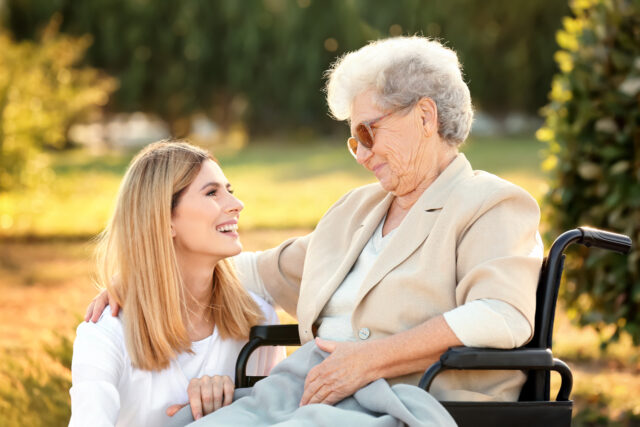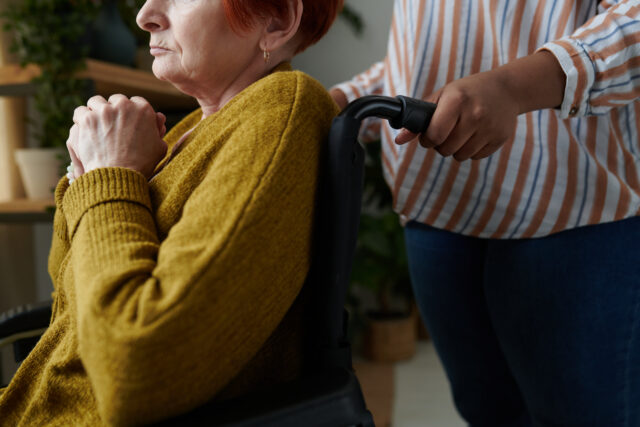
An Appreciation of Professional Caregivers
My 85-year-old mother had been up a few times during a night in early June and still wasn’t feeling well in the morning. I called her doctor, who sent a prescription to her pharmacy, and went about my day’s work. But when I checked in that afternoon, mom was in a full-blown medical crisis that she and her 92-year-old male companion did not think was bad enough to tell me about.
I asked her companion to call the EMTs, who immediately dispatched mom to an emergency room a few miles from her Orlando retirement community. These events marked the start of my maiden voyage as my mother’s caregiver from 1,300 miles away in Boston. It was a high-stress affair that challenged all my organizational skills and stamina – an experience I am, no doubt, destined to repeat.
I’ve heard about the stresses of caring for an elderly parent but had only a vague sense of what that would be like. Nearly a week was consumed with keeping tabs on mom’s medical care at the hospital and what she needed, tracking down busy nurses and doctors – in a pandemic! – for updates on her condition (pneumonia) and treatment. Finally, upon mom’s hospital release on a Sunday, I wanted to make sure nothing else would go wrong at home.
The clouds started to lift when I hired three professional caregivers – Rachel, Nadine, and Rosa – to keep an eye on my mother for the first 24 hours at home. I developed a great appreciation for their kindness and efficiency and the unique talents each one brought to the job.
The hiring process wasn’t seamless, however, due to the COVID. My mother and her partner are fully vaccinated. But Florida has a much lower vaccination rate – 62 percent of adults have at least one dose, compared with 81 percent in Massachusetts – and I quickly learned that 35-year-old Rachel, the first caregiver assigned to mom, was among the unvaccinated.
I was about to cancel the contract with the company employing the caregivers when they offered to give Rachel a rapid COVID test. That worked for me. Having made my intentions crystal clear, the company texted me Nadine’s and Rosa’s vaccine cards for the later shifts.
Rachel arrived at 3 p.m., a few hours after mom was back home. Rachel was adept at figuring out how to help my mother, including supporting her while walking Luna, her Chihuahua, and standing nearby while she took a shower.
The next caregiver, Nadine, a Haitian immigrant – she allowed me to practice my French – was a calming presence in the house. She heated up frozen chicken pot pies for mom and her partner – not to mention offering conversation for my socially starved mother. Nadine couldn’t figure out the blood pressure machine, and there wasn’t much for her to do in the evening.
But she did make sure my mother took her medications and ably performed the most important job: being there through the night while my mother slept. Knowing Nadine would contact me if a problem arose allowed me to finally get some sleep too.
Rosa arrived promptly at 7 a.m., and mom, who was still too weak for housekeeping, asked Rosa to wash a load of laundry and clear the moldy and wilting food out of the refrigerator. I told her the one thing I wanted her to do during her 8-hour shift was buy groceries and prepare a warm, filling meal for mom and her partner.
Luckily, Rosa cooks a delicious pan of chicken, beans and rice. My mother was so overcome by the aroma wafting through the house that she ate the chicken for lunch – she couldn’t wait for dinner.
After Rosa left, mom was on her own. But a couple of my Orlando cousins dropped by over the next two days with chicken sandwiches and a pot of lentil soup. By that Friday – five days after leaving the hospital – mom was ready to play bridge. Mission accomplished.
Many caregivers are immigrants, who work for low pay. I’m sure Rachel, Nadine and Rosa got much less than the $25 per hour I paid their employer. That’s a shame, because their pay should better reflect the invaluable work they do.
Squared Away writer Kim Blanton invites you to follow us on Twitter @SquaredAwayBC. To stay current on our blog, please join our free email list. You’ll receive just one email each week – with links to the two new posts for that week – when you sign up here. This blog is supported by the Center for Retirement Research at Boston College.
Comments are closed.







Happy to hear your mom is back to her bridge game. I had a similar experience in 2001-02 when my mother, 86, had a UTI which put her in hospital for a week. My experience was not as good as yours.
Her discharge came unexpectedly and I had to scramble on a Friday for a caregiver, a potty chair and Depends. Caregiver had to be replaced when jewelry went missing and long distance calls to Haiti were on mom’s phone bill and she flirted with neighbors. Other than that she did care for mom with food and daily maintenance.
By the time my sister came to visit, mom was well enough to be on her own, except for the dementia. But that’s another story. Mom died in 2005.
Thank you, Kim. This is an all too common scenario when aging parents live far from their children. I am heartened to hear that your mother received such gracious and compassionate care.
I had a very similar situation with my 97 year old grandmother living several states away. At the time, she was in independent living and had some issues – I needed to quickly hire help, while being remote in another state, in order to ensure her well being. After the incident, I ended up moving her into assisted living within 5 min of my home – she lived there for 5 years until she passed away at the age of 103! Being close to her, and me being seen by staff in the assisted living facility, providing regular feedback on her care, in my opinion, was critical. I learned alot in those 5 years about caring for elderly family members. Know that your situation will occur again – you need to plan for what is next for your mother and how you will manage her world. You got lucky this time as nothing major happened (ie. she didn’t need extended care, etc.). However, you need to be ready the next time as it is very hard to have others be your eyes & ears in a crisis situation – no one will care more for your mother’s well being than you!